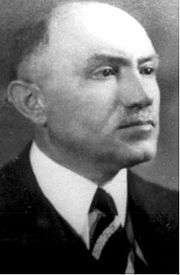Bahri Omari
Bahri Omari (1888–1945) was an Albanian politician, publisher, and writer.
Bahri Omari | |
|---|---|
 | |
| Born | 1888 |
| Died | 1945 Tirana, Albania |
| Nationality | Albanian |
| Occupation | member of parliament, foreign minister |
| Known for | Enver Hoxha's brother-in-law, executed by the same |
| Spouse(s) | Fahrije Omari (Hoxha) |
Life
Born in 1888 in the city of Gjirokastër, Janina Vilayet, Ottoman Empire (today Albania) he became at 25 the prefect of the city of Himarë in southern Albania. He fought against the Greek Army during the Greek Occupation of Albania.[1]
In 1914 Omari went to the United States where he became a director of the Albanian newspaper Dielli of Vatra, the Pan-Albanian Federation of America. In 1919 he returned to Albania and participated twice in the parliamentary elections, in 1921 and 1923, representing the party of Myfit Libohova. In 1924, during Fan Noli's government he was elected general secretary of the National Democrat Party and of its organ, Shekulli.[1]
After Noli's exile caused by Ahmet Zogu in 1924, Omari went to Italy where he stayed until 1939, when he went to Tirana. In 1942 he became a member of the Balli Kombetar organization. During the occupation of Albania by Nazi Germany he became Minister of Foreign Affairs. For holding this position, he was arrested and put on trial in the Special Court of Spring 1945 organized by Koci Xoxe and Enver Hoxha, his brother-in-law.[1] He was executed by firing squad in 1945.
See also
- Communism in Albania
- June Revolution
References
- Özdalga, Elisabeth (2005). Late Ottoman society: the intellectual legacy. Routledger. p. 315. ISBN 0-415-34164-7.